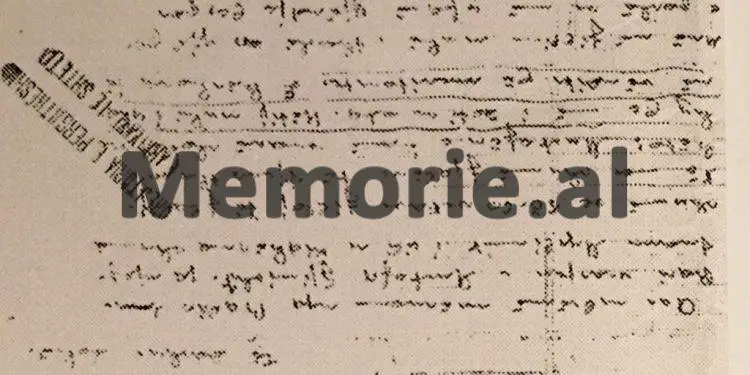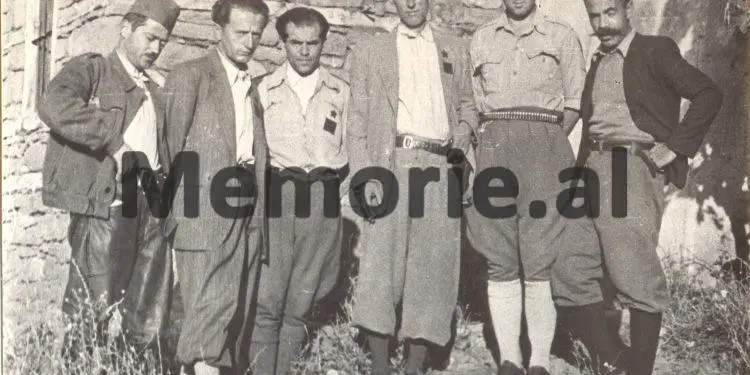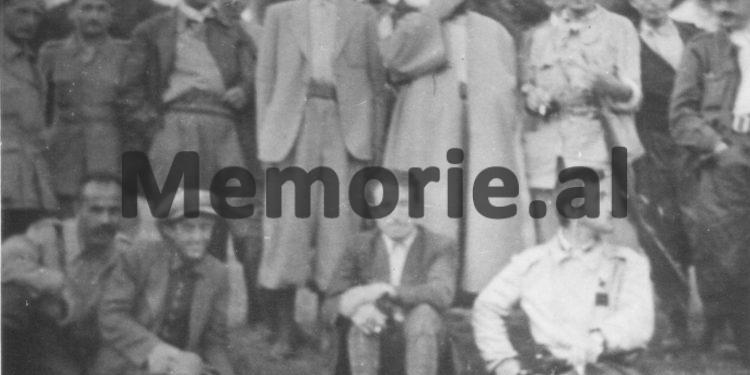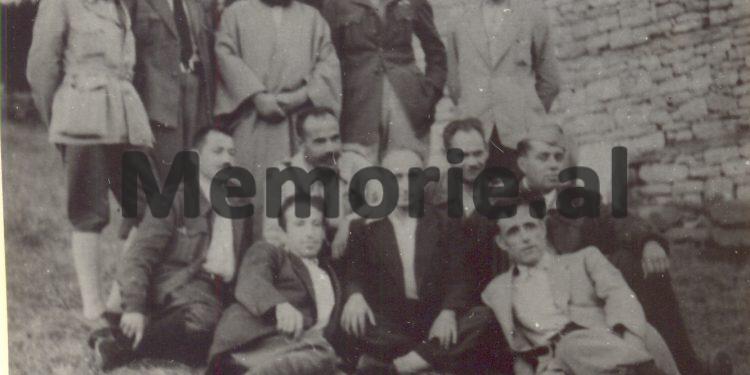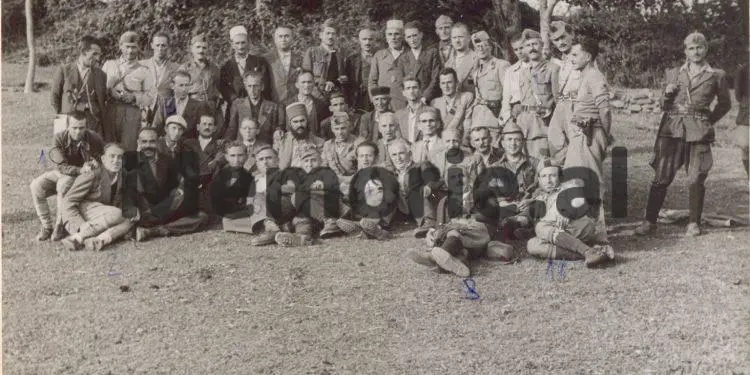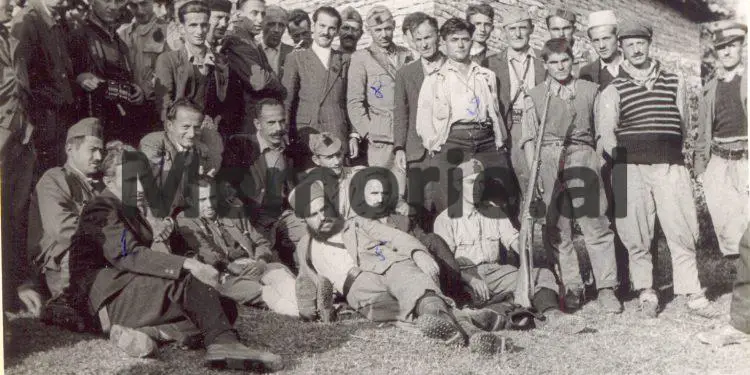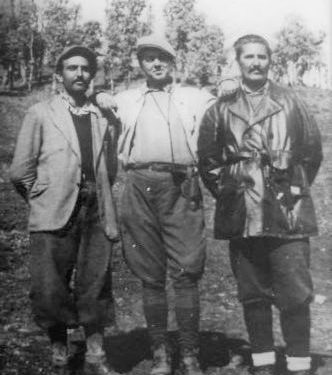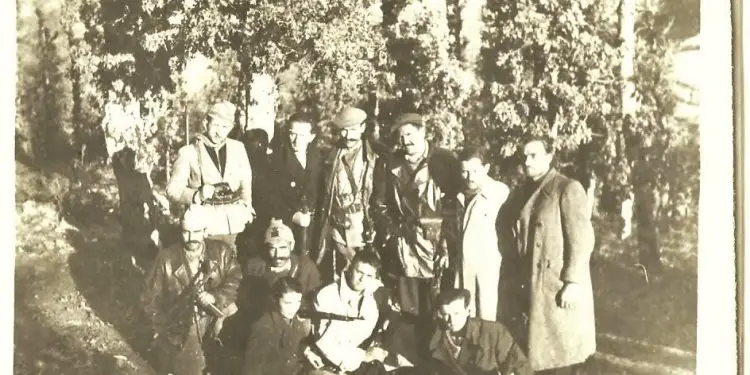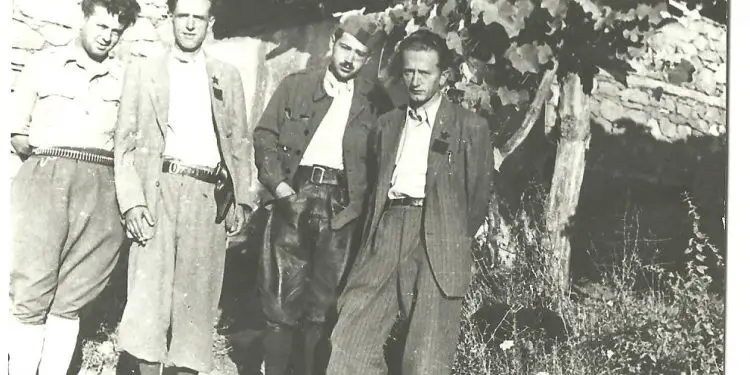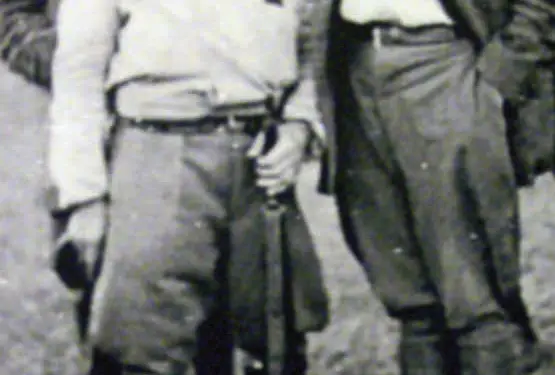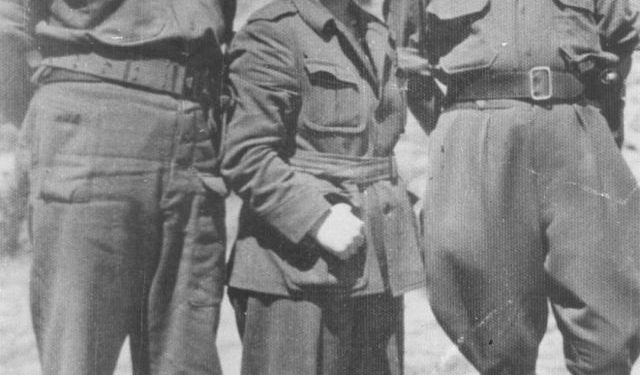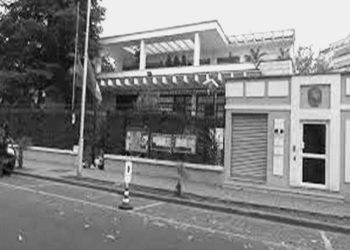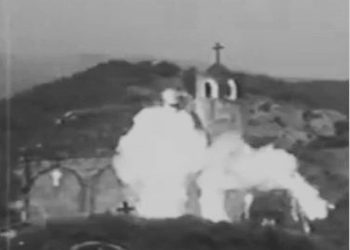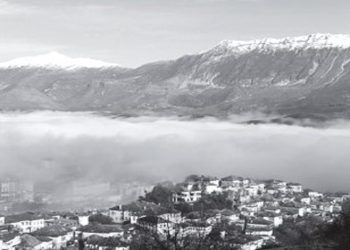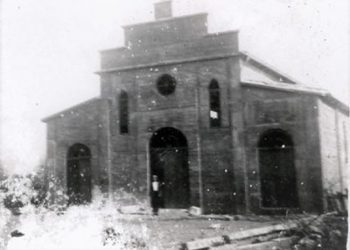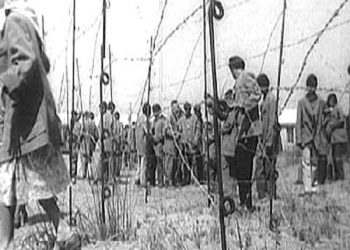Dashnor Kaloçi
Memorie.al publishes an archival document extracted from the Central State Archive in Tirana, which belongs to the month of August 1944, where there is a report of Gogo Nushi (signed with the nickname ‘Hyseni’), sent to the Central Committee of the Albanian Communist Party regarding the news given by Radio Bari, about the murder of Mustafa Gjinish, where he writes, among other things: “When we learned from Radio Bari about the murder of Mustafa Gjinish, we informed Myslym Peza, who was very upset but did not say A few hours later, when he started drinking brandy, in the presence of 50-60 people, he said: “Mustafa was killed by his comrades, because he was better than them. He was not given the place he deserved. I asked him to come.” in Peza, both Mustafa and Hsan Reçi, but Ramadan Çitaku did not leave me with friends, who gave you mustaches. As well as the order of the day of the National Liberation Army of August 26, 1944, where Enver Hoxha, among others, announces: “On the front of Maqellara and Dibra where the forces of the First Assault Division, under the command of Major General Dali Ndreu, five days in a row they fought furiously against the great German and Zogist forces which were badly defeated with great losses, our friend, Lieutenant Colonel Mustafa Gjinishi, was martyred in the field of honor”
Regarding the mysteries of the murder of one of the most important personalities of the Anti-Fascist War, Lieutenant Colonel Mustafa Gjinish, former member of the Presidency of the National Liberation Council and the General Staff of the partisan Army commanded by Enver Hoxha, a murder which at that time and then made a big fuss about the personality and authority enjoyed by Gjinishi, both communists and nationalists and also about the circumstances that led the top communist leadership to eliminate him, Memorie.al has written in two consecutive issues in the dossier section in, some time ago. In those two articles we made public the testimonies of two of Enver Hoxha’s closest people during the war period: his secretary at the General Staff, Gjystina Sata (or as she is known as Flora Dishnica) and Shyqëri Këllez, who were Enver’s personal bodyguards.
After the War, Këllezi was a member of the Central Committee of the ALP until 1950, when he was expelled from that high forum (along with Abedin Shehu and Njazi Islam) and was sent to various positions as General Director of Railways, etc., and in 1980, after retiring, was sentenced to eight years in political prison accused of “enemy of the people.” In those two testimonies given by them, light is shed on the truth of the murder of Mustafa Gjinish, which was carried out on the order of Enver Hoxha, following the orders of the two Yugoslav emissaries Dusan Mugosha and Miladin Popovic. Memorie.al returns once again to that distant event, illustrating it with archival documents from the Central State Archive, in which the truth of the murder of Mustafa Gjinish, one of the main leaders of the Albanian Communist Party, is best illuminated. Led by Enver Hoxha.
In this article, in addition to a brief history of the life of Mustafa Gjinish and his family, we are publishing the memoirs and testimonies of Enver Hoxha for his murder, (publishing also the order of the day of the National Liberation Army on August 26, 1944, where the murder was announced as well as the archival document dated 8 August 1944, where Myslym Peza, gives his version of the murder and the real perpetrators who ordered his physical elimination, without dwelling on his executors, who were then decorated with the ranks of general, or as members of the Political Bureau of the Albanian Communist Party, to be later physically eliminated as “enemies of the people.”
Who was Mustafa Gjinishi?
Mustafa Gjinishi was born in 1910 in a small village near Peqin and his family at that time was one of the most famous in that area. His father, Adem Gjinishi, joined the Fan Noli-led group of politicians in the early 1920s, and during the 1923 parliamentary election campaign, he was assassinated in unknown circumstances, but that assassination was attributed to him. His political opponents. According to some testimonies made public at the time, it is said that his killers were the people of Shefqet Vërlac, whom Ademi had as a political opponent.
In the late 1920s, Mustafa Gjinishi was able to obtain a state scholarship to continue his studies at the American Technical School of Harry Fultz in Tirana. That scholarship was awarded to him by King Zog, who was in the habit of helping the families and orphans of all his political opponents. After finishing that school in Tirana with very good results, Mustafa Gjinishi returned to his family who lived near Peqin, who continued to be hostile, both to the Vërlacs and to the Government of King Zog, from who also had some problems as a family. Based on the situation of his family, Mustafai was forced to emigrate outside Albania and settled in Yugoslavia, where he gained political asylum.
According to some testimonies, archival documents and memoirs of former British missionaries in Albania and Yugoslavia during the period of the country (1939-1944), during the period of emigration to Yugoslavia, Gjinishi was employed for some time as a translator at the British Embassy in Belgrade. Since he knew English well, which he had learned at the American school in Tirana? After the fascist aggression against Albania in 1939, Mustafai joined Abaz Kupin, Mustafa Kaçaçi and some other political emigrants who had immigrated to Yugoslavia after the Italian occupation. In the framework of the organization of the Anti-Fascist War in the Balkans, which was taken over by the Anglo-Americans, at the beginning of 1942, with the help of the British Major Crissp, Gjinishi returned to Albania together with Abaz Kupi and Mustafa Kaçaçi. During the illegal return to Albania, they passed through Dibra, where they got in touch with Haxhi Lleshi and together with him came to Tirana where Gjinishi immediately got in touch with Myslym Peza, who was his father’s closest friend. , Adem Gjinishit.
After the meeting with Myslym Peza, Gjinishi together with Koço Tashko were appointed by the Central Committee of the SNP to get in touch with the nationalists and invite them to cooperate in the interest of the War with the Front and the SNP. Before the Peza Conference was held, Gjinishi and Koço Tashko had drafted a platform demanding that the Communist Party bring to the ranks of the Front all anti-fascist nationalists who had given evidence that they were for war against the Italians. On that platform, in addition to concrete names like Muharrem Bajraktari and Abaz Kupi, they demanded that the Catholic clergy of the North who had opposed the fascist occupation of Albania be called to the ranks of the Front. They also demanded the arrival at the Front of Mehdi Frashëri, who had been interned by the Italians as an anti-fascist.
But in the realization of that platform, they saw as the main obstacle Enver Hoxha, who held a hostile attitude towards the nationalists and since they could not realize their idea for the Front, Koço Tashko, a few days after the Peza Conference, made a long letter to the Comintern, where he directly accused and denounced the position of Enver Hoxha. During the war, Mustafa Gjinishi was elected to the highest bodies and forums led by the Communist Party, such as the seven-member National Liberation Anti-Fascist Council and a member of the General Staff of the National Liberation Army formed on July 10, 1943 in Labinot of Elbasan. Also at the Mukje Conference, Gjinishi was elected Secretary of the Meeting, where the famous agreement was reached, which was later broken by Enver Hoxha, after the intervention of two Yugoslav emissaries of the Albanian Communist Party, Dusan Mugosha and Miladin Popovic.
Enver’s testimonies in his books about Mustafa Gjinishi
Regarding Mustafa Gjinishi, from his arrival in Albania after emigration and his activity and contribution during the War, as well as his assassination, Enver Hoxha in his memoirs published in 1982 in the book “When the foundations were laid”, among others wrote: “Gjinishi was a smart, dynamic, active, but arrogant man, closed to us and not sincere. He spoke with gestures to create authority. He wanted to show that he had great connections and influence on Myslym Peza as well as on many anti-fascist nationalist circles implied that in these circumstances his words and advice were heard a lot. Regarding the people he met, he did not tell us anything concrete. Later we learned where his “bases” and “support” were. illegally he roamed all over Tirana in black glasses, blue clothes, sometimes with kilts, sometimes with borsalina and sometimes with a cap wearing a white capardi and carrying a black bag with papers, a dozen turkeys and some bomb jugosllave. Our people reported to us that he went and met Irfan Ohri, Mithat Frashëri, Sheh Karbunara, Kamber Qafmolla, Abaz Kupi and others. What he talked to them, he told us a few concrete things. With the arrival of the English mission, Gjinishi swallowed us like a cat in rye, although he and they kept the appearances. Mustafa “cheerful”, “interesting”, and “sincere”, as the English said about him, had the advantage that he knew English and could speak fluently with them, and translate back and forth. “We tried to make the connection between some meetings of the British with” nationalist “personalities and the meetings that Mustafa had previously had with this people who had now opened with Balli, but nevertheless we had not yet found the beginning of the elaboration of this mess.” In his memoirs, Enver wrote that at that time he received a signal from BBC Radio addressed to “Tafar”, which according to him was the nickname of Gjinish, which was also confirmed by Mustafa Kaçaçi. Summoned Ginishi to Labinot and forced him to tell the truth that he was an agent of the British and Gjinishi admitted that he was their collaborator for the good of Albania. Lieutenant Colonel Hill and he had launched it in Albania together with Abaz Kupi. About this meeting Enver wrote: “After several hours of brainstorming between us, weighing everything: the circumstances of the war, the district sh ocular and the acquaintances of Gjinish, his dangerousness, his treacherous actions, his arrogant, bayraktar character, the full assertion of activity, we decided not to sentence him to death. We forgave him because he promised us that he would remain loyal to the party, but he never became a good man, continued the path of betrayal and was and remained the agent of the English. On the eve of the Youth Congress in Helmas, I met with English Lieutenant Colonel Lick, who knew we would hold a Congress. Here is another sign I thought that the English would have an informant in our ranks and that informant was Mustafa Gjinishi. This thing had long since become clear to me. As we were leaving Helmësi in the direction of Staravecka, Gjinishi stayed last and after remembering that there was no one else behind, ran in a turn and met an English officer who gave him a letter. Mustafa turned his head and as soon as he saw that we had dictated it, he put the letter in his pocket and continued on his way. When we asked him to deliver the letter to us, he told us, “He did not deliver the letter alive.” And he did not hand it over because he did. We cursed him and left him without saying anything, but he just said, “Do what you want, I am like that and I will remain like that.” Enver later said that he informed his friends about that and that he threatened Gjinish again that if he continued that way he would give the order to arrest him and that Myslym Peza asked him to become the president of the court for his sentence. Regarding the murder of Gjinish, Enver Hoxha wrote in his memoirs: “After the Congress of Përmet, we sent Gjinish to the North, near the partisan units. Again we treated that man with indulgence. But the wolf changes his hair, but he usually forgets. Even there, despite the heavy punch he had eaten, he did not let the maneuvers and riots to hit the party. In August 1944 an English officer sent me a message that had come from his General Quarter in Bari, Italy, where it was said: “For General Hoxha. I regret to inform you that Mustafa Gjinishi was killed in the Front of the First Division. He and Smith had been put into the well by a German patrol. Smith sound. A great loss for the allied cause. “And at the end the officer himself added:” Gjinishi was a great friend of ours. “It was so clear to us, too, that he was and remained until he died alongside the mystery Smith, the Englishman, their agent and servant.”
Enver notification of Gjinish’s murder
DAY ORDER OF THE NATIONAL LIBERATION ARMY
On the front of Maqellara and Dibra, where the forces of the First Assault Division, under the command of Major-General Dali Ndreu, fought furiously for five days in a row against the large German and Zogist forces which were badly defeated with heavy losses, fell a martyr on the field of honor, our friend, Lieutenant Colonel Mustafa Gjinishi, Member of the Presidency of the National Liberation Council and Member of the General Staff, Lieutenant Colonel Mustafa Gjinishi, tireless and fearless fighter, without sparing anything gave his life in the front lines of the liberation war of the Homeland and the Albanian People. His loss should motivate us to further intensify the fight against the occupier and his servants. As a sign of mourning and to honor the memory of Comrade Lieutenant Colonel Mustafa Gjinish, we order all units of the National Liberation Army to fly their flag at half-staff, for three days in a row from today. Glory to the fallen heroes in the realm of honor.
V.F. L.P.
Command. i Pergj. Of the National Liberation Army
Colonel-General Enver Hoxha
On. 26.8.1944
(State Archive F.41 / AP. D.158 V. 1944 Fl.8)
Gogo Nushi’s letter to Enver Hoxha about Gjinish’s murder
But unlike the version given by Enver Hoxha, both in the order of the day of the National Liberation Army in August 1944, and in his memoirs in 1982 regarding the circumstances of the murder of Mustafa Gjinish and the real perpetrators who ordered his assassination, speaks an archival document dated August 31, 1944, where Gogo Nushi with the nickname “Hyseni”, shows how he reacted at the time, Myslym Peza, when he was informed of the news of the murder of Mustafa Gjinish. In this archival document (which the author of this article originally published on 15.IX.2002 with the relevant facsimile in ‘Gazeta Shqiptare’), it is stated:
CENTRAL COMMITTEE
ALBANIAN COMMUNIST PARTY
Dear friends:
The day before yesterday we learned from Radio Bari, the murder of Mustafa Gjinish. Here we informed Myslym who was very upset but did not say a word. After a few hours, after he started drinking brandy, in front of more than 50-60 people he started talking. Among many other words, he said: “Mustafa was killed by his comrades, because he was better than them. He was not given the place he deserved. I asked him to bring both Mustafa and Hasan Reçi to Peza, but he did not left Ramadan Çitaku with friends to whom you mustache. Mustafa, before leaving Përmeti told me that they would send me there from Dibra and I would be deported there. If it were not for Mustafa and me, there would be nothing in Albania. “We fought. We gave the command of the 1st Division to Dali (Dali Ndreu), who during the winter was not able to keep even 20 people on his feet, but came and crashed in Peza”.
Baba showed great hatred against Dali, Baca (Ramadan Çitaku) and Haxhiu (Haxhi Lleshi). I did not say anything to him at the beginning, why did I see what his condition was, but… “/Memorie.al
Social greetings Hyseni
Peza, 31.8.1944
(State Archives. F.14 / AP. D. 44 V.1944 Fl. 41, 42, 45)




